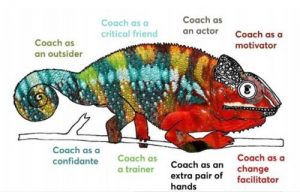Nesta Catalysts
What is a Catalyst?
One of the unique things about the 100 Day Challenge is the role of catalysts. There is a catalyst for each team. The catalyst is there to support the team through the ups and downs of their 100 Day Challenge; sometimes as a motivator, facilitator, coach, confidante or an extra pair of hands – whatever the team needs.
The NESTA training calls this flexible role a Chameleon Coach.
Meet our Catalysts
Zainab Dhukai
Jessica Waugh
Seb Gooderson
Rosi Avis
Interested in becoming a Catalyst?
MLCO is currently recruiting catalysts for the next wave of 100 Day Challenges. If you would like to apply, please contact Katharine Irwin for more information.
A maximum of two catalyst posts will be made available to people who work for the voluntary, community and social enterprise (VSCE) sector. The remaining posts will be filled by staff employed by our five partners:
- Manchester University NHS Foundation Trust
- Greater Manchester Mental Health NHS Foundation Trust
- Manchester City Council
- Manchester Health and Care Commissioning
- The Manchester Primary Care Partnership.
Katie Finney
My Catalyst experience
“Training and being a catalyst on the MLCO 100 Day Challenge has been such a great experience. It’s a very particular role that requires deep listening to recognise what the team needs and be agile in action, as well as anticipating what may be needed ahead and how to fit that into the context of very full and vital work in the life of team members day-to-day.
It’s a privilege to be alongside these amazing people who are so motivated and open to doing things differently. I find the variety particularly rewarding. I enjoy having a sense of the whole system and how I can be most helpful in supporting innovation and new relationships. I’ll go from being hands-on at a community centre talking to local residents, to supporting the team reflect and plan, then on to chatting with executive sponsors about how the challenge is going.
Navigating under the 100-day time constraint how to best contribute to positive experiences and outcomes in all these spaces is the part of being a catalyst I like the most. When I am told I’ve helped keep things on track and supported the team through stressful timesso that they can bring their diversity of skill and expertise to improving lives for people – that’s really amazing. This experience shows me that change is possible, it offers a glimpse of what is needed to achieve the ambitious aims of the MLCO and I’m grateful for the opportunity to play a small part in that.”
About Katie Finney
As Director of amity CIC, Katie offers group and 1:1 support for collaboration and co-production in the charity, voluntary, community and social enterprise and public sector. Through programmes for people seeking to lead change, to work differently and explore new ideas on both a personal and collective level, Katie coaches and facilitates community and system leaders to take steps towards their goals – helping make this exploration fruitful and rewarding via an approach informed by her training, experience and collaborations.
amity was recently nominated as business of the year at the Spirit of Manchester Awards for facilitating groups in a way that fosters participation, creativity and ownership from all involved in co-design of innovative solutions to community or organisational challenges. Katie’s co-production expertise has deepened over the past three years as a result of co-producing urban governance for social justice with the Jam and Justice Action Research Collective. Katie loves surfing, preparing and eating plant based food, relaxing in nature and spending fun time with friends and family.
Seb Gooderson 
My Catalyst experience
“This is the first time I’ve been a catalyst, I’m excited to be working with experienced practitioners who are up for testing out new ways of working to improve the lives of local people.
“I enjoy supporting people and thinking creatively about how we address some of the challenges that public services face. Being an MLCO catalyst was a great opportunity to do this.
“I’m also interested to see what I can take from my experiences and apply in my own context. In my day job I work in local government, supporting voluntary and community organisations. On the surface this is about the administration of funding but more fundamentally it’s about the building of partnerships. In my view good relationships are really important but equally are the hardest part of the job, so anything that gives tools, techniques and insights into how to build and maintain strong working relationships is valuable.”
Zainab Dhukai
My Catalyst experience
“Training and being a catalyst for the 100 Day Challenge is a very unique experience. The training has given me a dynamic insight into different approaches to coaching and the skills required to be an effective coach.
“Being a catalyst allows for a lot of flexibility which takes into account the personality of the catalyst themselves, and also the varying makeup of the type and practitioners that you coach. What I love about it is that there is no definitive right or wrong way of doing things. You are given the tools and training, it is then up to you as the catalyst how you want to use them!
“I have found the training and approach conducive to health innovation itself. The creativity and dynamic nature allows for the space where teams can really think outside of the box and innovate. Teams generate ideas and perspectives that would not normally arise in their day jobs, really coming up with bold ideas and making them happen!
“In my experience there have been days where I have been sitting on the outside and reflecting back to the team my insights. On other days, I am totally immersed, engaging with local people at a grassroots level.
“I have been a catalyst for two waves of the 100 Day Challenge in Manchester. The two teams’ projects reached out to very different populations of people. The first was south Asian communities with diabetes and the second was asylum seekers and refugees with mental health issues. In both cases, it was clearly essential that front line practitioners needed to meet people with lived experience to discuss issues and topics that related to their situation or condition. Listening to these stories and experiences created a safe space for real empathy and compassion, which is an area where services can sometimes struggle. This helped to build trust and relationships between services and the communities they serve.
“The 100 Day Challenge encourages rapid testing as we only have 100 days to make an impact. This allows for quick wins and speedy reflection – if certain approaches/interventions do not work, you move on quickly to the next test.
“At the end of the 100 days, it is amazing to look back at the team’s journey as they share their story and insights into their experiences of learning and development.
“Being a catalyst has been a massive personal and professional development for me, it’s not often that you can work with teams and get a real sense of being in it together, like a family, to the point where I have had invites to weddings from the people with lived experience!
“It has been a great honour and privilege to be involved and pave the way for MLCO for more innovative and exciting work in the future!”
About Zainab Dhukai
Zainab is a trained psychological wellbeing practitioner who has over 12 years experience of working with the NHS and local authorities on the mental health agenda. She specialises in working with black and minority ethnic (BAME) communities through creativity and the arts.
Zainab has developed community-based creative projects, which build resilience and provide a platform for people to tell their stories through theatre and the arts. She has delivered theatre productions with women who have been victims of abuse, and developed other art and culture projects which have formed training and development for mental health services, police and prisons. She was part of a team that developed The Barbershop Magazine winning the North West Health and Social Care Innovation Award for Community Arts.
Currently a freelance practitioner, Zainab is enthused by everything that involves health innovation using creativity, collaboration and compassion, whilst working with vulnerable groups whose voices and experiences are seldom heard.
Zainab enjoys photography, hiking and loves to travel. She also openly admits to having a slight obsession with trees, in her spare time goes forest bathing and swimming – not at the same time!

Jessica Waugh
My Catalyst experience
“I have worked at the Council for who years, primarily working with the voluntary sector through the Our Manchester Voluntary and Community Sector (OMVCS) grants programme.
“I wanted to become a catalyst because I’m really interested in new ways of working and I can see the link with the purpose of the OMVCS grants programme. The programme was created as a way of the Council trying new approaches to voluntary sector funding and changing the way we work with the sector. I thought this would be a great experience to continue and improve that approach in different settings.
“I’m really looking forward to trying new ideas in the 100 days. I think what makes that most exciting is that we have system leaders’ permission and support. I think that’s really going to challenge and push the teams to do things they never could have imagined doing before.”
 Rosi Avis
Rosi Avis
My Catalyst experience
“To quote Tony Wilson, “This is Manchester. We do things differently here”. It is such an exciting time for Manchester as we move towards a new way of working – a way that incorporates how the people we work with would like us to operate, not how systems dictate we should behave.
“Having worked in the past with care-experienced young people, I’m all too aware of the damage that can be done by a rigid system that doesn’t listen to the people within it. I’ve been keen ever since to try and break down walls and deliver services that really listen to and work for local residents.
“Once I’d gone through the catalyst training, I was hooked – I couldn’t wait to get a chance to drive forward this kind of approach in one of our neighbourhoods and to support people through the change.
The 100 Day Challenge is definitely shaking up the system and will no doubt be a bit uncomfortable and difficult for people to get on board with at times, but the catalyst role gives me a great opportunity to put my ‘people person’ skills into practice to help bring people along the journey with us.
“I can’t wait to see what kind of new thinking we can bring to the neighbourhood I’m working with, which will hopefully plant the seed for delivering services which work for people.”
About Rosi
Rosi works at Citizens Advice Manchester as the Partnership and Communication Lead, managing strategic relationships with external commissioning and delivery partners such as Manchester Health and Care Commissioning, The Big Life Group, MS Society and others.
Rosi has been a key part of the design and delivery of their ‘Advice on Prescription’ service, which puts access to advice into primary care settings in order to tackle social inequalities which impact on health and wellbeing. She also has responsibility for internal and external communications work, and oversight of the organisation’s social policy activity.
In her spare time, she’s a fitness enthusiast, spending as much time as possible running, bouldering and playing disc golf. She also enjoys baking and feeding up colleagues with delicious cake, as well as weekly singing sessions with local community singing group, Shylarks, where she’s a member of the Teaching Team.

 In this section
In this section